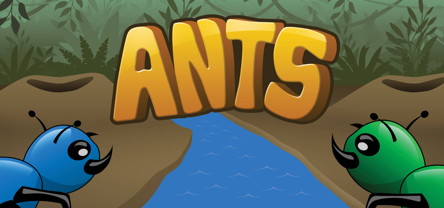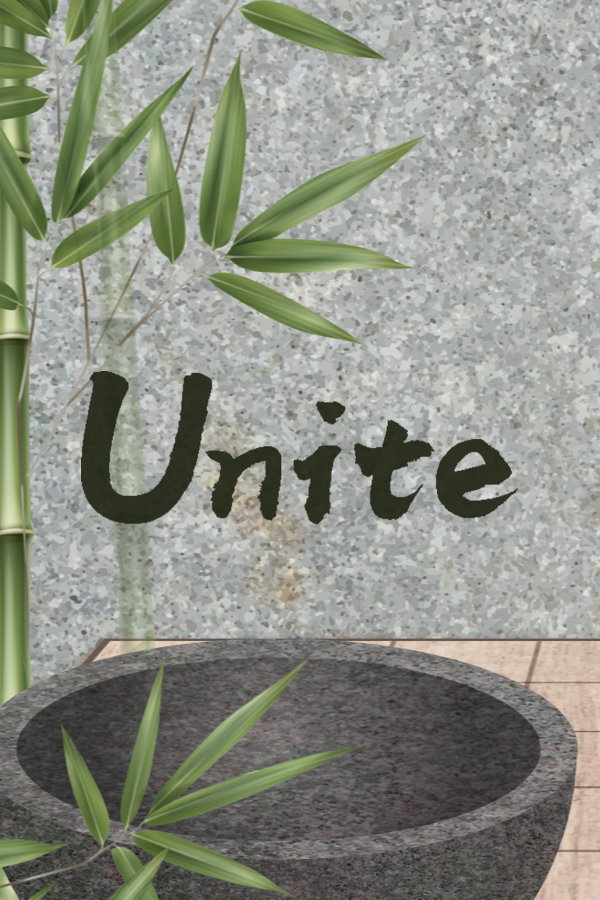|
We had breakfast by the outdoor pool, which is fed by a small
artificial waterfall. Their breakfasts aren't much different than
what we have in the States. Eggs, bacon, sausage, assorted pastries,
fruit, cereal, toast, juice, coffee. I will say that their sausage
tastes a bit strange, and their bacon is more like Canadian bacon.
After breakfast we checked out, but still had a couple hours to
kill before our scheduled transport to our next destination, the
Daintree Eco-Lodge. We spent some of that time browsing the gift
shop, buying a souvenir boomerang (which is guaranteed not to
come back). We then went to the Cockatoo Lounge to rest. There
was an Internet terminal there, but it was out of order. Instead,
I spent the time reading Lance Armstrong's book.
Around noon we went back to the pool area and had sandwiches for
lunch. At 1pm, we walked back to the reception area to wait for
our driver. He was already there, waiting for us. There was one
other couple sharing the van with us on the ride to the Eco-Lodge.
He put our bags in the back and we were off on a 45-minute drive
north, past more sugar cane fields, to Daintree Eco-Lodge.
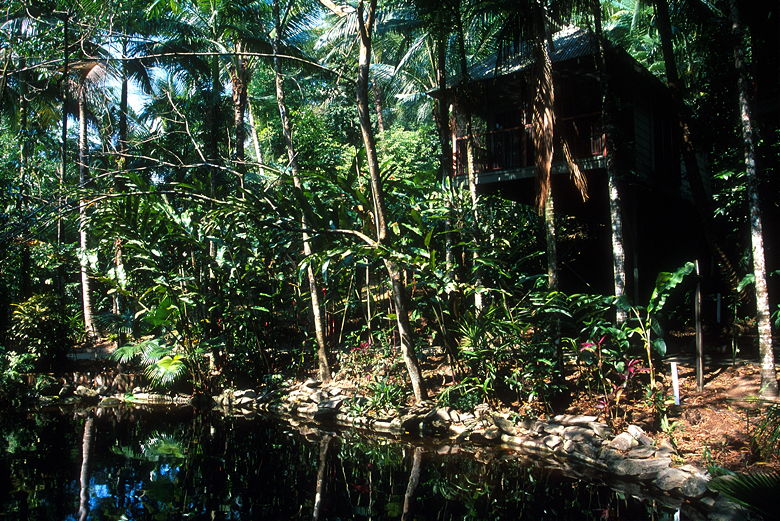
One of the Eco-Lodge villas amidst the trees over the pond
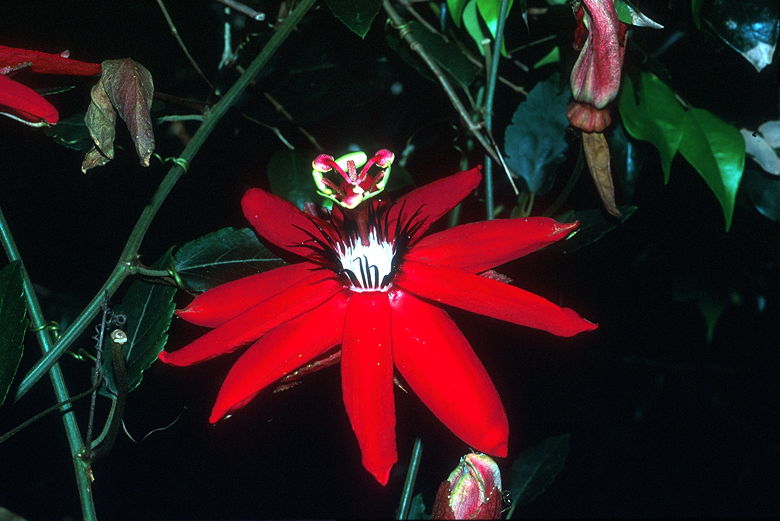
One of the many red flowers on the grounds
We checked in and then got a guided tour of the spa facilities
before being led to our private villa. There are 16 different
villas, each a separate building on stilts above the rain forest
floor. Elevated wooden walkways connect the villas to the reception/spa
building, and a restaurant and pond on the ground below. Our villa
was at the very end, with another villa on one side and a hillside
on the other. Bright red flowers dot the lodge property. Brush
turkeys (black with red sacks underneath their beaks) roamed freely,
very accustomed to human presence.
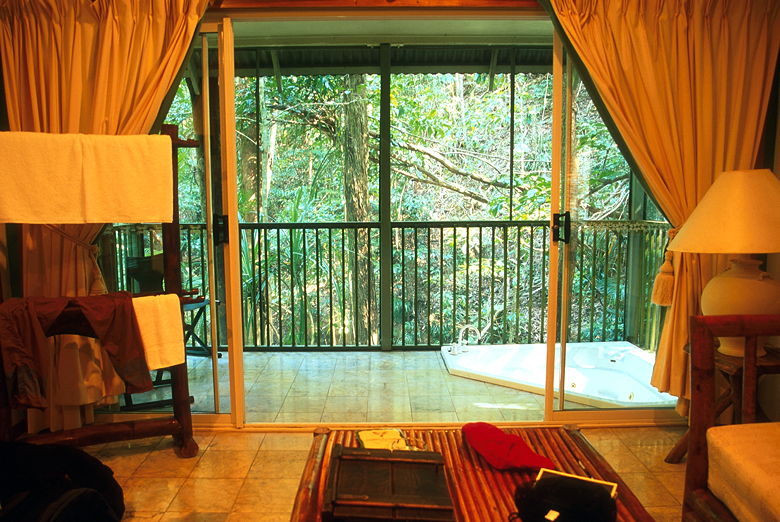
Our room -- the balcony is netted so we didn't have to worry about
bugs
Jean decided to get a spa treatment and facial. They couldn't
do both of us at the same time today, so I was left to myself
for awhile. I decided I'd take a short walk out to the waterfall
on the property. However, after going for a couple minutes, I
decided I was a big chicken. I'd hiked alone before, but never
with so much wild life making their presence known. There were
mostly bird sounds all around. But I was worried about what I
didn't know was out there -- poisonous snakes or spiders or strange
mammals. Plus, no one knew where I was going. So I turned tail
and headed back to the villa.
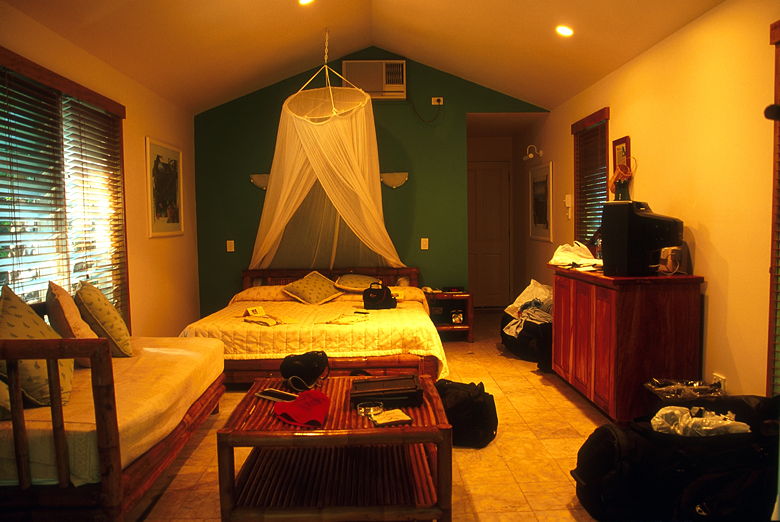
Inside our villa
Jean came back very relaxed and at 6:15pm we went down to the
restaurant to meet Dan Irby, our Mangrove Adventures guide who
would be taking us on a night cruise of the Daintree River. The
Daintree River flows roughly west to east, into the Pacific Ocean
(it actually starts out in the opposite direction before turning
around). It's the most amazing river we've ever seen.
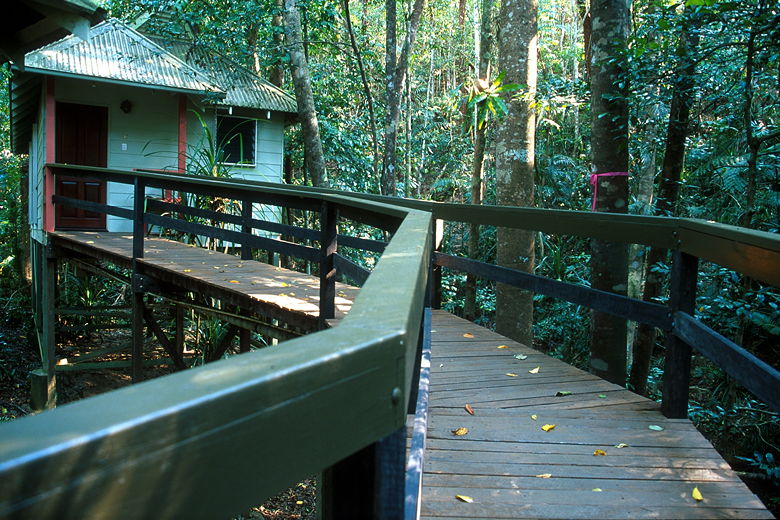
Walkway to our villa
Dan showed up at the lodge, barefoot. We'd later learn from his
promotional flyer that he has "28 years in medical and zoological
research in USA and Australia, has published over 40 international
scientific papers, is a successful wildlife artist and photographer,
moved to Daintree in 1993 and started Mangrove Adventures." We
didn't know all this when we first took his tour, but we did know
that he was an excellent guide.
Dan guided us and 4 other people across the road and through the
bushes for a couple minutes before we reached his boat tied up
on the river. It's a small, 6-meter long, uncovered boat which
has room to sit 10. It has the advantage of being small so it
can go where larger boats can't, and it's uncovered so we can
see all around us.
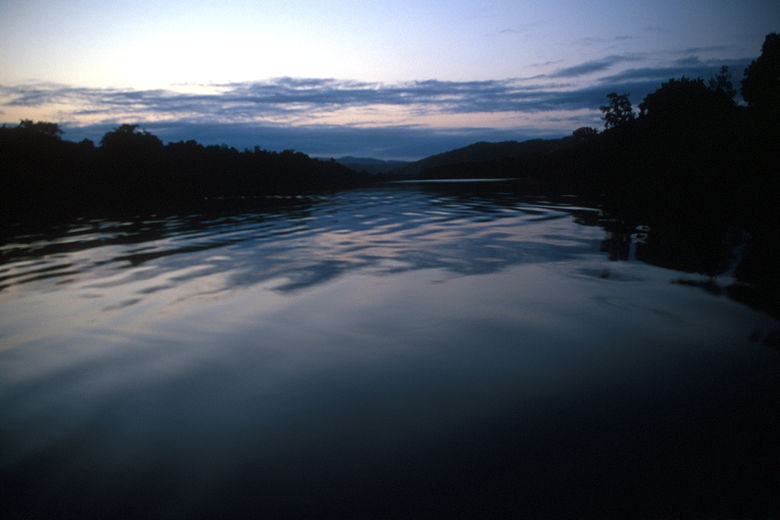
Sunset on the Daintree River
As the sun was setting, Dan took us out into the main Daintree
River where we enjoyed a few moments of peace and quiet. It wasn't
quiet for long, however. As he steered us toward one of the many
side creeks, he told us to look up. High above us, we could see
fruit bats circling in the air. Thousands of them live along the
river, and later in the year (it was still spring) they would
turn the sky black at times. For now, we could just see dozens
of them circling high above, and listen to the flapping of their
wings. Occasionally they'd come closer to our boat, and later
into the night we'd see even more of them. We took comfort in
the fact that these bats eat fruit, not humans. =)
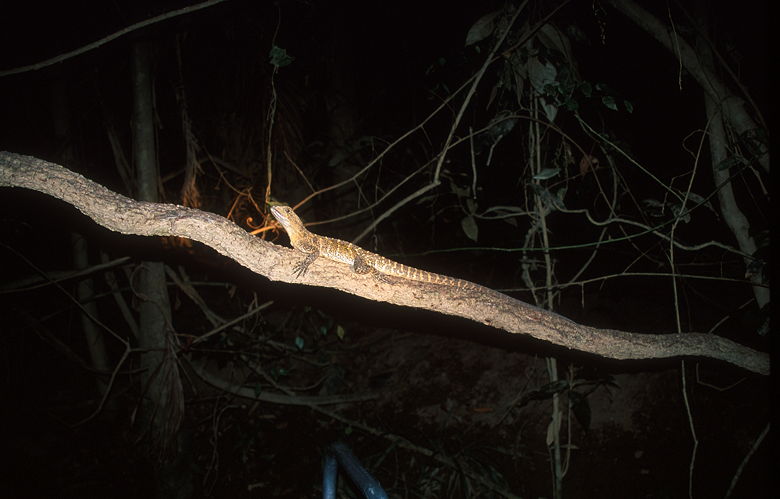
One of several lizards we saw
Dan took us into a small side creek he called his magic garden.
To get there, we had to go underneath a car bridge. The challenging
part is that at certain times of the day, the tide makes it impossible
to cross underneath. Yes, the tide. The tides from the ocean penetrate
upstream on the Daintree River as much as 30 kilometers inland,
and has a huge impact on the vegetation and wildlife.
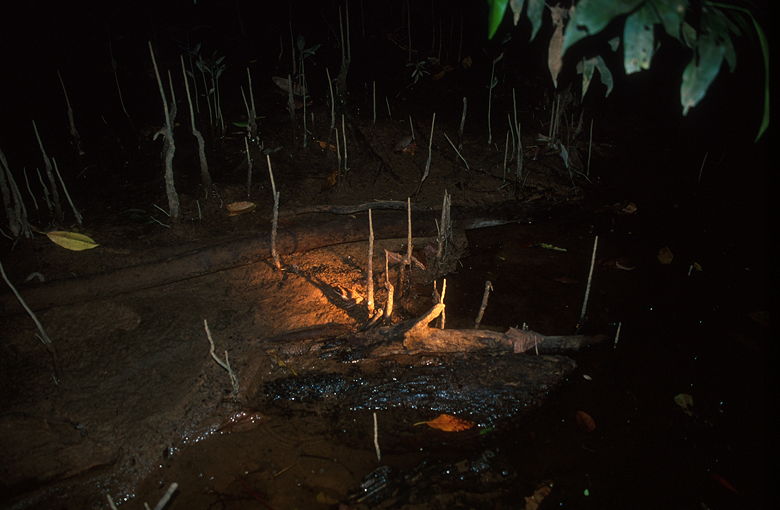
Pneumataphors, which the mangroves use to breathe
The magic garden is full of mangroves -- trees which grow on the
edge of the water and can handle both the river's fresh water
and the ocean's salt water. Mangroves, as we would discover, are
special in and of themselves. However, what made this creek even
more special was that at night, armed with a flashlight, you can
see the mangroves make perfect reflections in the water. Of course
I tried to capture all this on film. Unfortunately, I would later
look in my camera book and discover that my built-in flash simply
wasn't powerful enough and that most of my pictures would turn
out black (which they did). Time to get a more powerful flash.
It didn't help that I hadn't been aware we were going to do the
night cruise and hadn't armed myself with fast film -- indeed,
I was shooting with my standard slow ASA 50-speed film.
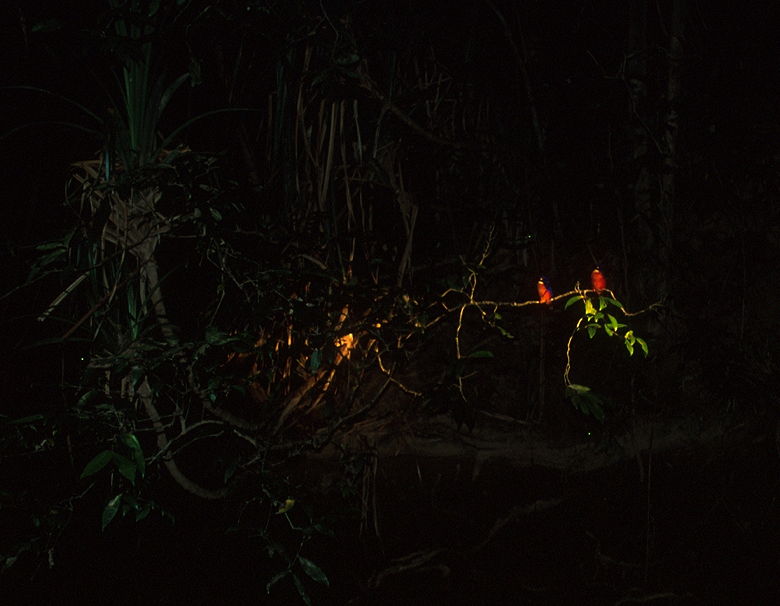
Kingfishers
At least I did manage to get a couple pictures of the amazingly
cute Kingfishers. These tiny little birds are bright blue and
orange. Dan brought the boat up close to them, but they never
moved. There were two of them -- a happy couple -- and they were
busy sleeping.
At a couple points Dan stopped the boat and let us listen to the
river. It was alive. Or rather, the trees on either side were
alive with the sound of all kinds of birds. Jean and I are used
to hiking in alpine environments, where we'll hardly hear a peep
of life. This was a welcome change (well, except at 5am, but I'll
get to that).
Armed with a single flashlight which he swung around this way
and that, Dan showed off his amazing eyesight, spotting lizards
on several occasions. He'd bring the boat closer and it would
take 10 or 15 seconds before any of us mere mortals could see
what he was pointing to. He brought us by this one dark spot on
a stump. It wasn't just a dark spot -- it was thousands of tiny
flies! We also saw a frog or two sitting on branches.
We turned around and headed back underneath the bridge again.
This time, we all had to duck a little, as the tide was rising.
Another hour in there and we would have been in trouble.
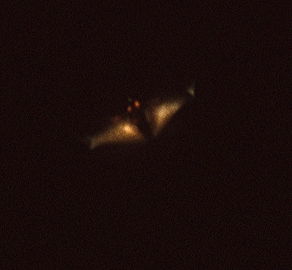
Bat!
Even more bats came out of the forest to pass over us on the river.
Soon they were everywhere. Some carrying babies. I kept waiting
for them to fly lower so I could get a good photograph. I managed
only one decent shot. Trust me, it was much more impressive in
person. Dan brought us to a group of trees on the side of the
main river where he told us to look up. There, 30 feet above us,
was a fruit bat hanging off of every single branch of all the
trees in that area. Hundreds of them. It was truly an amazing
sight.
Apparently one of the major goals of a river guide in Australia
is to find a crocodile. I'm not sure if this is mainly for the
guide's benefit, or for the passenger's benefit. In any case,
we tried. Along the way we saw fish jumping out of the water near
the boat. Not sure what kind of fish. There are lots of varieties
in the river. The main fish that anglers go for, and the kind
that Australians seem to like to eat, is a fish called Barramundi.
It's a white fish, and I'd try it for dinner the next night.
We spotted what Dan said was probably a 14-foot crocodile. Unfortunately,
about all we saw was the shining of its eyes from far away. As
we pulled the boat closer, it slipped into the water. They can
spend hours underneath the water, if they so choose, and they
chose to tonight. We saw a couple other sets of crocodile eyes
later, but they slipped away as we got close.
We also passed a couple fishermen in a boat. Dan told them: "Did
you know there's a fourteen-foot crocodile over there?" They obviously
hadn't, but that explained why they weren't catching any fish!
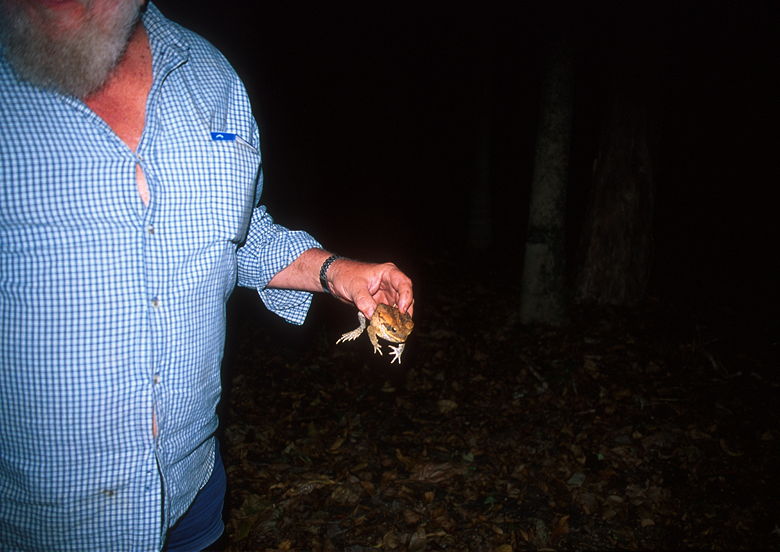
Dan with frog in hand
After two wonderful hours on the river, Dan brought us back to
shore. On the short walk back, he found a frog which he simply
picked up. They don't move very fast!
We got back to the Eco-Lodge restaurant (called the Baaru House)
and immediately sat down for dinner. The restaurant has both inside
and outside (by the pond) seating. Inside there's a big vaulted
ceiling, candle lighting and dark wood furnishings. We each had
great mediterranean salads. I had a wonderful main course of shrimp
in wonton skins. One of the things we had to get used to was their
use of the word entree. They use "entree" as we would use "appetizer,"
and "main" as we would use "entree." It took a bit getting used
to, but at least it's consistent throughout the country.
There's also quite a strong Asian influence on the cuisine in
Australia. Not just up north, either. Pretty much everywhere we
went in Australia they were serving Asian vegetables and food
served in Asian styles. And not just the Asian restaurants, either.
Where else in the world can you see wonton skins and kangaroo
meat on the same menu?
After dinner we made the short walk up to our villa. Our villa
was equipped with a jacuzzi, but we were too tired to use it at
any time during our stay. Instead we just went to sleep.
| 










